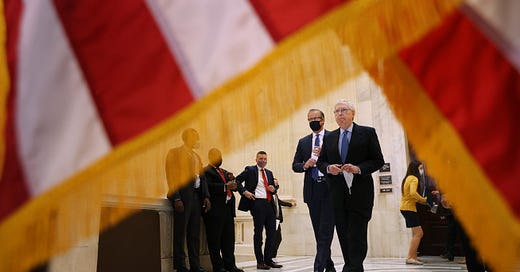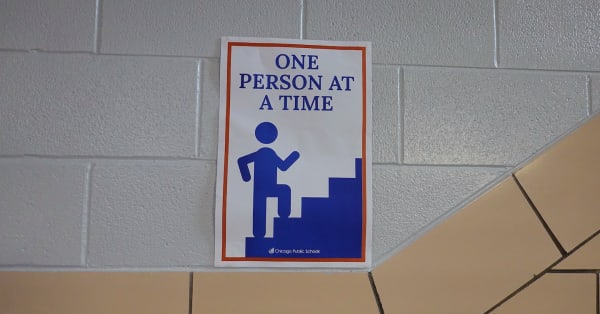ICYMI: The assault on the Capitol was three (3) months ago today.
**
If we’ve learned anything in recent years, it is that Republican principles have the consistency of Silly Putty.
Character mattered, until it didn’t. Conservatives were for free trade; until they weren’t. Republicans said they cared about the deficits and the debt, until they said screw it. They were against tax hikes, except for tariffs. Once upon a time, they even used to believe in the peaceful transfer of power.
But even given their nearly infinite flexibility, it is still remarkable to watch the GOP’s full 180-degree flip on business and the First Amendment.
Because we needed to exhume irony and murder it once again, the charge is being led by Mitch McConnell, who is shocked, shocked (!) to learn that corporations are involved in politics.
“I found it completely discouraging to find a bunch of corporate CEOs getting in the middle of politics,” McConnell said Monday. “My advice to the corporate CEOs of America is to stay out of politics. Don’t pick sides in these big fights.”
And there was a threat.

In other words, nice business you have there. It’d be a crying shame if it was to experience any “serious consequences.” KnowwhatImean?
McConnell is hardly the only Republican threatening heretical businesses. I wrote about the new politics of retaliation here yesterday.
But McConnell’s indignation about corporations and politics is a very recent acquisition.


The GOP leader’s hypocrisy runs deeper than simply his penchant for pocketing corporate political cash. Until yesterday, he was one the senate’s foremost — and most outspoken — defenders of corporate free speech, at least when it came to spending money on GOP races.
After all, corporations are people, right?


Indeed, this was very much McConnell’s pet issue. Here is what he said back in 2012, when he worried about things like the “harassment and intimidation” of corporations for their political speech:
“It is critically important for all conservatives — and indeed all Americans — to stand up and unite in defense of the freedom to organize around the causes we believe in, and against any effort that would constrain our ability to do so,” McConnell said in the speech at AEI, a Washington group that says it supports free enterprise.
McConnell, long an opponent of restrictions on political contributions, cited a Democratic proposal to require corporations and unions to disclose their spending on political advertising….
“This is nothing less than an effort by the government itself to expose its critics to harassment and intimidation, either by government authorities or through third-party allies,” McConnell said.
Spoiler alert: Despite all the acrimony, not a single Republican in either the House or the Senate will vote to raise corporate taxes by a dime.
So, for the moment, this is just culture-war kabuki theater.
How are the boycotts going so far?
Speaking of free speech.


Best news of the day:

Voter suppression, you say?
National Review’s resident baseball crank has some thoughts about “actual voter suppression.”

Jonathan Chait has some thoughts of his own.
National Review editor Rich Lowry, parroting the official line from Georgia Republicans, insists, “It’s hard to believe that one real voter is going to be kept from voting by the new rules.” …
What makes the pious argument by the likes of [Ben] Shapiro and Lowry so odd is that conservatives historically support the notion of using restrictive voting laws to winnow the electorate. This view dates back at least to the early 1960s, when William F. Buckley famously quipped, “What is wrong in Mississippi, sir, is not that not enough Negroes are voting but that too many white people are.”
Even after National Review had to cease its opposition to the Voting Rights Act and then lost essentially the same argument again 20 years later when it defended white minority rule in South Africa, its writers have continued to periodically insist that the main problem with American elections is that too many people are voting. “Instead of making it easier to vote, maybe we should be making it harder,” argued Jonah Goldberg in 2007. “Why not test people about the basic functions of government? Immigrants have to pass a test to vote; why not all citizens?” In 2016, David Harsanyi complained, “We encourage Americans to vote as if it is the only right of a citizen, without any corresponding expectations.”
Commandeering the “Big Lie.”
You might recall how TrumpWorld appropriated the term “fake news” back in 2016. Now, writes Aaron Blake, they are seeking to retcon the term “Big Lie.”
Conservatives, though, are appropriating that phrase not to describe the predicate for laws like Georgia’s, but rather the pushback against it.
Senate Minority Leader Mitch McConnell (R-Ky.) used the phrase twice in a statement Monday accusing the corporations of falling victim to a disinformation campaign….
McConnell’s statement follows on a Wall Street Journal column titled “Corporate America’s ‘Big Lie’ ” that also focused on the voter ID elements of the law. Another well-trafficked column, from the Hill newspaper on Monday, attacked the MLB for pushing “Biden’s big lie about ‘suppressed’ GA voting.” Former House speaker Newt Gingrich said Sunday that Democrats were “engaged in big lie smear against Georgia.” Other conservatives have used the phrase, as well.
Exit take: If history is any guide, it might work.
Liz Cheney is a survivor. So far. Via Politico:
The Wyoming Republican became Trumpworld's public enemy No. 1 this year after her vote to impeach the former president, jeopardizing her career and leadership job. Since then, though, Cheney has racked up a string of wins that put her on more solid footing in the party — starting with her easy victory over a conservative-led effort to oust her as House GOP conference chair.
Her triumphs continued late last month, when the Wyoming state legislature rejected a measure endorsed by Donald Trump Jr. that could have made it harder for Cheney to prevail in what's likely to be a crowded primary field. Big names in the GOP establishment, such as former Speakers John Boehner and Paul Ryan, are lining up to help her stockpile cash. And a sex trafficking probe that threatens to take down one of her chief critics, MAGA-loving Rep. Matt Gaetz (R-Fla.), also gives Cheney some vindication — even inspiring viral memes about her reveling in her
Quick Hits
1. Kristi Noem Rides the MAGA Bronco
Amanda Carpenter with a fantastic piece in today’s Bulwark:
To compare Noem to former Alaska Governor Sarah Palin is to underestimate Noem. Both women may like wearing camo and fringe, but they aren’t twins. Noem is far more careful with her words and calculated in building relationships with allies. Which is probably why the backlash on transgender sports came as such a surprise.
That may have been the moment she realized she wasn’t in as much control of her own political destiny as she thought.
One gets the feeling by watching Noem and MAGA media reaction to her is that they see her as a vehicle for their own purposes rather than an entity in her own right. And, right now, she’s walking the fine line between playing in the big ring and getting played.
When Noem was on her transgender rehab tour, she phoned Glenn Beck, who recognized Noem’s unexpected squish status. Beck told her that he wanted to “pick up” from the conversation she had with Carlson that “didn’t go well” and talk about building coalitions.
“It’s amazing how fast people can turn,” he said knowingly.
Noem laughed quietly and ruefully. “Ha, ha, yeah.”
2. Can Democrats Survive the 2022 Midterms?
Richard North Patterson writes in this morning’s Bulwark that “today’s GOP reeks of nihilism—disdainful of governance, devoid of ideas, hospitable to extremism, addicted to racism, culturally divisive, contemptuous of democracy, and indentured to a loathsome and dangerous demagogue.”
But the Democrats have their own internal tensions. To start, while in 2020 the party gained among white college graduates, its share of minorities declined.
The growing allegiance of upper-class whites owes much to a progressivism, particularly on cultural issues, alien to many nonwhites. Notably, while the Latino vote in 2020 increased by more than 30 percent over 2016, the Democrats’ percentage fell—particularly among men.
By general consensus, causes include the Democrats’ perceived radicalism on issues of culture and law enforcement; a growing assimilation which muted sympathy for undocumented immigrants; a correspondingly diminished self-identification as a disadvantaged minority; and an attraction to the GOP’s perceived aspirational message—self-reliance, entrepreneurship, and upward mobility—which Donald Trump strove to personify.
3. The U.S. Should Vaccinate the World
Dalibor Rohac in today’s Bulwark:
Eradicating COVID-19 through a U.S.-led vaccination program is neither an overambitious fool’s errand nor a vanity project. It is a straightforward, cost-effective solution to the world’s most pressing problem—and a political opportunity waiting to be seized by leaders who dare to think big. Vaccinating the whole world quickly is eminently technologically feasible, relatively inexpensive, and guaranteed to galvanize public opinion in support of the United States against our autocratic foes. Let’s go big and—not for the first time in history—save the world.
Cheap Shots
When “treason” actually meant something.


And now, a word from the teachers union.











